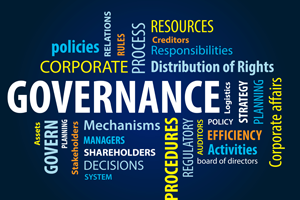Topic of the month May 2017: Corporate governance – pre-requisite for a sustainable Europe

Corporate governance – pre-requisite for a sustainable Europe
Good corporate governance, i.e. the responsible governance of a company, is one of the factors regarded worldwide as essential for sustainable economic activity. The European Commission, environmental and human rights organisations, and the Principles for Responsible Investment international investor initiative (UN PRI) all emphasise the responsibility that companies have to society and the environment. Responsible corporate governance takes account of long-term economic goals just as much as the effects of a company on the environment, society, business partners and employees. It is ultimately the binding force around all aspects affecting the company.
Key role for investors
Appropriate framework conditions are becoming increasingly important for the promotion of corporate governance. Commitments by investors such as the UN PRI or rules of conduct (see the German Investment Funds Association (BVI)) help, as do corporate guidelines like the German Corporate Governance Code.
Politicians increasingly expect trustees of assets such as asset managers to have an active influence. Not least because, for example, the European Commission wants to encourage both the shareholder’s long-term involvement and its transparency (cf. EU Shareholders‘ Rights Directive).
In this context, the voting right is one of the shareholder‘s most valuable rights and comes with the obligation to use it responsibly. The annual general meeting of a listed company is therefore one of the most important occasions for providing a critical stimulus – in some circumstances including with corresponding publicity for the company in question.
Strengthening market integrity and encouraging an investment culture
Good corporate governance makes an important contribution to strengthening market integrity by working alongside statutory or regulatory rules for combating price or market manipulation and insider trading. Investors pushing for institutionalised corporate governance help to ensure that business leaders obey laws and observe ethical standards, establish appropriate risk management and are transparent in their companies‘ reporting.
Credible companies whose securities are traded in a functioning financial centre with integrity are indispensable if a modern investment culture is to grow and flourish. That is important in Germany in particular, where the old public payas- you-go pension system is tending to lose significance, while personal and occupational pension schemes are gaining enormously in importance. But to accumulate sufficient assets, German savers need to overcome their aversion to securities, particularly equities, and increase their holdings of shares in listed companies. In this respect, corporate governance also makes an important contribution.
Increasing the appeal and competitiveness for financial centres
Responsible and active investors are valuable if a financial centre is to function well, because they broaden and diversify the sources of financing. This increases a financial centre‘s appeal and competitiveness, attracts sharp minds from all over the world and encourages the emergence of innovative business ideas and investment concepts.
A new field where financial ingenuity can blossom has been emerging since the UN Climate Change Conference in Paris in 2015 (COP21) and the efforts to decarbonise the economy: green finance. In the battle against global warming, cash flows from all over the world are to be steered into climate-friendly areas and out of those that “fuel” the climate crisis. Following placement of the first green bond by the European Investment Bank (EIB) in 2007, Poland and France have since become the first countries to take up the baton and issue green bonds. Many issuers and investors see great potential for the future in the green bonds segment.
Adapting financial market regulation
In today‘s economies, the focus on short-term reporting appears to be ubiquitous. In addition, this pressure from the market is further strengthened by the large number of regulatory requirements, especially those created by regulatory authorities during the financial crisis. Mark-to-market valuation, liquidity and short-term capital requirements refer to short time-frames – sustainable aspects with longer-term horizons tend to be ignored.
However, focusing on short-term horizons conflicts with a more sustainable development of the economy. A change of thinking is needed, particularly to achieve the internationally agreed climate protection goals and the associated decarbonisation of the economy.
Financial market regulation must be adapted to this end. In its current form, it works against long-term development goals. It would be a worthwhile task for European institutions to create conditions that steer market forces in the right direction.
For example, the European Commission created an expert group on sustainable finance at the start of 2017. The aim of the group is to help develop an overarching and comprehensive EU strategy for sustainable finance in order to integrate sustainability into European financial regulation on the way to capital markets union. The first results of the work are to be presented and publicly debated in the middle of the year. The follow-up work will extend until the end of 2017. Ideally, it will succeed in showing the need to switch to a long-term focus in financial market regulation.
More transparent corporate policy is rewarded with higher share prices in the long term
The changing environment also requires companies to make adjustments. For example, the efforts to achieve the climate goals are definitely associated with further costs. This is not just because of new and more extensive reporting requirements, but also the associatedworkflows and business models. And, in addition to environmental requirements, stricter standards are gradually being set with regard to social criteria and issues of good corporate governance.
The cost, however, is dwarfed by the benefits that arise for companies. Any company that acts in an exemplary manner in this respect can do more than just improve its public image, boost its reputation, recruit good staff and reduce its consumption of resources and its costs. It can also very tangibly reduce financing costs and tap into new investor groups. In addition, studies have shown that the stock market rewards a more transparent corporate policy with higher share prices in the long term.
Ultimately, responsible corporate governance and its monitoring by investors who actively engage with companies help grow sustainable prosperity of civil societies.
Author: |
About Deka Bank DekaBank is the Wertpapierhaus of the German savings banks and, together with its subsidiaries, forms the Deka Group. With customer assets totalling approximately € 240 billion as at december 2016 and around four million managed securities accounts, the Deka Group ranks among Germany’s major securities service providers. It ensures access to a wide range of investment products and services for retail and institutional investors. Deka therefore sees it as its duty to cultivate a securities culture in Germany that is even more closely aligned with the interests of the individual investor and society as a whole, and hence sustainable in the best sense of the word. For Deka, this also means helping to make sustainable investing possible with responsible banking products and services. For more information, please visit www.deka.de |



